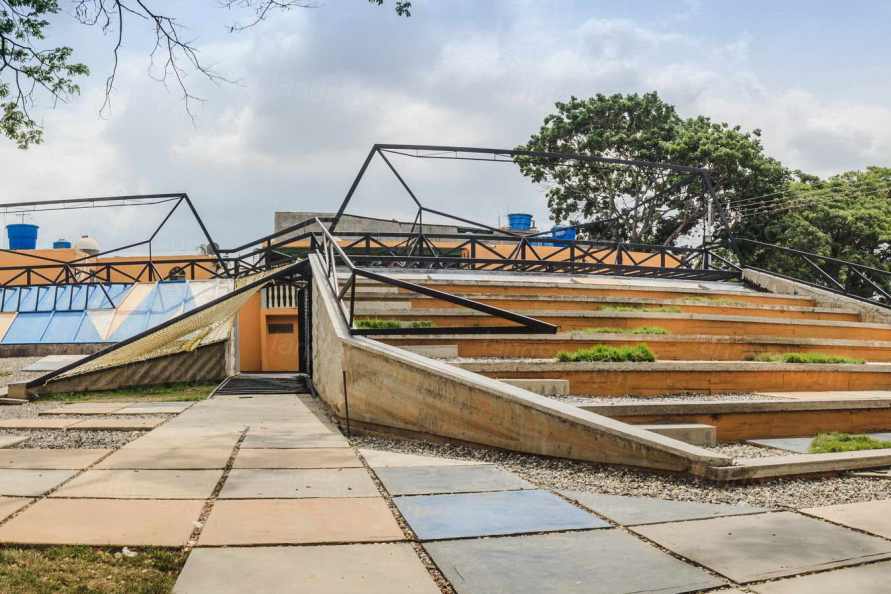场地之前处于在城市结构和非结构化的网状结构之间的危机中,它在市民之间建立了不可逾越的障碍、密封和心理边界。被社会所放弃的空间,容易给违法和犯罪提供温床。项目干预的目的是产生和巩固新的公民生活方式,并在这种城市条件下激活当地的经济。
The proposal is immersed in a crisis between the urban fabric and an unstructured mesh, which has established impenetrable barriers, hermetic and psychological boundaries between its citizens. The social refusal to use the interstitial space has left the conquest of this transitional space to delinquency and crime. The intervention is aimed at producing and consolidating new ways of life for citizens and the activation of new micro-economy systems in this urban condition; imprinting on these imprecise territories, soils, connectivity surfaces and programmatic units that are intertwined with local productivity and talent mapping.

通过发展民用基础设施和生态休闲方案,该项目成功地将所有的体育、文化和援助团体合并在一个基础的模式中,试验了一种基于集体管理形式的微观经济新模式。参与和地方合作的协议是创建地方的一部分,通过新的城市网络,建立与文化相联系的消费新动力。两种城市模式之间的中间领域,重点是为社会生产单位提供支持性基础设施。
Through the development of civil infrastructures and ecological recreational settings, the project has managed to amalgamate in a legal-based model, all sports, cultural and aid groups, experimenting with a new model of micro economies based on forms of collective management. Participation protocols and local cooperation are part of the creation of places and build new consumption dynamics linked to culture, through the new urban network. The areas of intermediation between both urban models are suture operations, focused on providing a support infrastructure for the socio-productive units.

坡度是该空间的主要问题,由于顶部没有排水系统,公园和相邻的房屋上都出现了水浸现象。通过开挖作业、插入捐赠的预制构件和修建挡土墙等方式对坡面进行了稳定。这些单元被布置成社会生产要素,其主要面被拆除,以便于通行,并作为挡土墙的模板。
The main slope of the terrain was a major problem for this space; Due to the lack of drainage in the upper part, floods occurred in the park and on the adjacent houses, which uncovered the roots of the existing trees. The slope was stabilized through surgical excavation operations, the insertion of donated precast units, and the construction of retaining walls. The units were arranged as socio-productive elements, and their main faces were removed to allow accessibility and to be used as formwork for the retaining walls.


对景观的操作和新地理环境的营造,通过对开挖土的压实,实现了第二套装置的安装,为公园的文化和生产活动搭建了坡度和场景。土壤系统成为该地的表现基地和文化流露,利用地形和景观的分层,新的人行连接路线被衔接起来,重新规划了城市结构和潜在的空间。
The operation on landscape and the creation of new geographies was achieved by compacting the excavated earth to be used in the installation of a second set of units. The operation built slopes and stages for the park's cultural and productive activities. The flooring system creates new playful scenarios, allowing an open theater that reveals its mechanisms in the open air, as the basis for the expression and cultural effervescence of the place. Taking advantage of the topography and the stratification of the landscape, new pedestrian connection routes were articulated that reprogrammed the urban fabric and potentially the territory.



将场地重新设计与文化动态相结合的方式集中在横向化至少六个互补的方案上,通过整合战略性地放置在土地边界上的集装箱的电池为场地功能。这些集装箱里有支持各种方案活动的生产单位:文化餐厅/酒吧、信息中心、制造车间、艺术和手工艺、舞台组装设备以及当地制造纺织品和手工制品的服装车间。恰恰是这些单位,保证了园区的循序渐进和社区认同感的巩固。
The way to combine the reengineering of the territory with the cultural dynamics focused on mainstreaming at least six complementary programs, through the integration of a battery of containers strategically placed at the limits of the land to contain the land; the operation simultaneously manages the resources and provides infrastructures for the public space. These containers contain the production units that support the various programmatic activities: cultural restaurant / bar, information center, manufacturing workshop, arts and crafts, equipment for setting up stages and a costume workshop for the local manufacture of textiles and pieces. handcrafted. It is precisely these units that ensure the progressive and incremental development of the park and the consolidation of community identities.





Name: Parque Cultural Los Cerrajones
Design Firm: Yemail Arquitectura
Architects: Alejandro Haiek (LABPROFAB) + Antonio Yemail (OFICINA INFORMAL) + Rafael Machado-Fabio López (Insitu)
Location: Urbanizacion Cleofe Andrade, Barquisimeto Venezuala.
Area: 6500 m2
Year: 2015 (En proceso)
Cooperation: Irina Urriola, Génesis Orozco.
Work team: Felipe Cuartas, Luis Mutti, Enrique Henríquez.
Project Manager:
Fase 1: Figueroa, Robert Montilla, Rafael Suarez.
Fase 2: Anabel Méndez.
Photographer: Irina Urriola
|